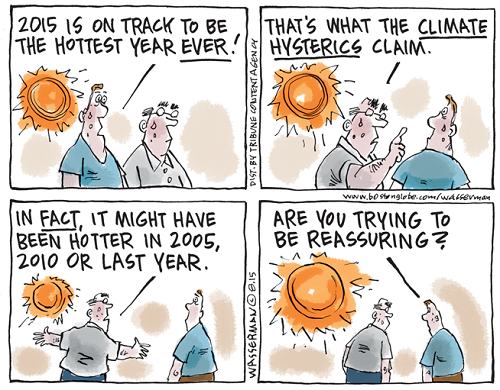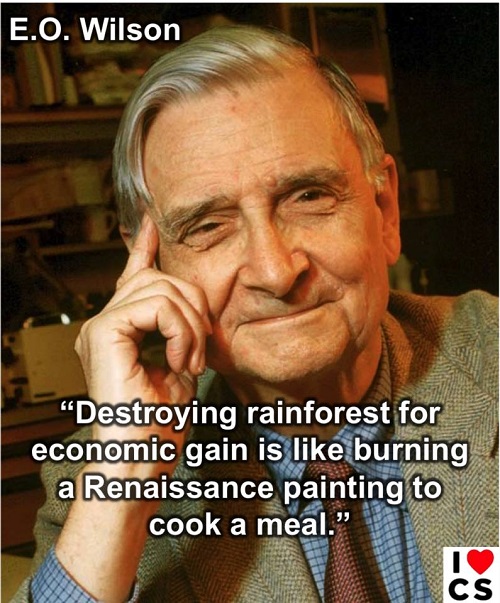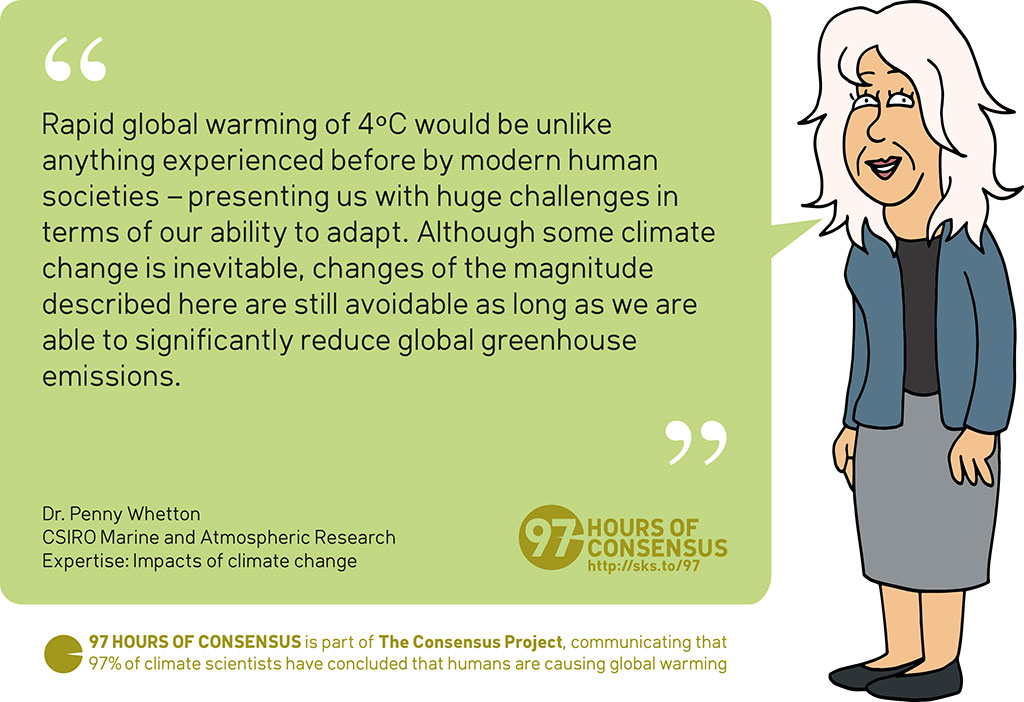2015 SkS Weekly Digest #35
Posted on 1 September 2015 by John Hartz
SkS Highlights... Toon of the Week... Quote of the Week... Poster of the Week... Coming Soon on SkS... SkS Week in Review... and 97 Hours of Consensus
SkS Highlights
Tracking the 2C Limit - July 2015, the first of a monthly series, by Rob Honeycutt garnered the most comments of the articles posted on SkS during the past week. Here’s what happens when you try to replicate climate contrarian papers by Dana drew the second highest number of comments.
Toon of the Week

Quote of the Week
“Our sense of the ocean’s power and omnipotence – combined with scientific ignorance – contributed to an assumption that nothing we did could ever possibly impact it”, says Katie Auth, a researcher at Worldwatch and one of the authors of the report.
“Over the years, scientists and environmental leaders have worked tirelessly to demonstrate and communicate the fallacy of such arrogance.”
Too warm, too few fish: Health warning for world’s oceans by Kieran Cooke, Climate News Network, Aug 23, 2015
Coming Soon on SkS
- Denial101x MOOC - Full list of videos and references at your fingertips (Larry M & Baerbel W)
- Climate change and Hurricane Katrina: what have we learned? (Kerry Emmanuel)
- Climate change set to fuel more "monster" El Niños, scientists warn (Roz Pidcock)
- The pope, climate change and the cultural dimensions of the Anthropocene (Andrew J Hoffman)
- 2015 Weekly News Roundup #36 (John Hartz)
- 2015 Weekly Digest #36 (John Hartz)
Poster of the Week

SkS Week in Review
- Citi report: slowing global warming would save tens of trillions of dollars by Dana Nuccitelli (Climate Consensus-the 97%, The Guardian)
- 2015 SkS Weekly News Roundup #35 by John Hartz
- How to make sense of 'alarming' sea level forecasts by Andrew Glikson (The Conversation)
- You can’t rush the oceans (why CO2 emission rates matter) by Howard Lee
- Tracking the 2C Limit - July 2015 by Rob Honeycutt
- Here’s what happens when you try to replicate climate contrarian papers by Dana Nuccitelli (Climate Consensus-the 97%, The Guardian)
- Adapting to air pollution with clean air stands in China by John Abraham (Climate Consensus-the 97%, The Guardian)
- 2015 SkS Weekly Digest #34 by John Hartz
97 Hours of Consensus: Penny Wheton
































 Arguments
Arguments






























As the first day of Autumn arrives it is perhaps pertinent to note that despite the single "hottest day ever" on July 1 (transiently at Heathrow Airport) the forecast of a "BBQ summer" so loudly trumpeted by our wonderful Met Office, failed miserably (for us all) to arrive. I'm sure that when the records are reviewed and the appropriate adustments made, 2015 will be, globally at least, exceedingly warm but please can we be spared the never ending series of dud forecasts about snow and cold and sun and heat from the error prone BoM?
Remarks by the President (of US) at the GLACIER Conference — Anchorage, AK, September 01, 2015, transcript
Bold, blunt, honest.
Katrina. 10 years we were told because of global warming the Gulf and the Atlantic Ocean are getting warmer. I agree.
Then the global warmimg forecasters/modelers said that the Gulf would suffer more and more violent hurricanes because of the warming.
Well that hasn't happened. No category 4 or 5 hurricanes ahve hit the east/South coasts in the 10 years. Florida has had the quietest 10 years of hurricanes.
in fact the drought in Texas and Oklahoma can be attributed to the lack of good tropical storms coming off the Gulf.
[Rob P] All caps - a breach of the comments policy - removed.
Fairoakien, please cite this 2005 prediction of increased gulf coast hurricanes in the ten year period now past. Who made it? Where?
Fairoakien, beside seconding CB Dunkerson in his request, I'll add that Sandy may have escaped you attention but certainly did not go unnoticed with the people on the East coast...
An article very pertinent to the remarks of ryland and Fairoakien:
"Increasingly, projections about hurricanes or winter storm are being posted by a range of people and often it is hard to distinguish between a credible forecast by an experienced meteorologist or the opinion of a hobbyist that is getting ready for the high school prom. Such opinions can create conflict and confusion in potentially life-threatening situations."
The forecasts to which I referred were made by the UK Met Office as reported in the Guardian "This year was to be different, we were told. A "barbecue summer" – from no less an authority than the Met Office itself."
"Yesterday, though, the Met Office conceded what Britons have seen with their own eyes over the last few weeks: apart from a fortnight in June, the summer has been more soggy than sizzling. And it's not likely to get much better in August, a prediction that will disappoint, if not entirely surprise" (http://www.theguardian.com/uk/2009/jul/29/summer-weather-forecast-rain-holiday)
These would appear to be credible forecasts from experienced meteorologists
Fairoaken,
This article on the extraordinary hurricane season in the Central Pacific is relevant. The predictions were that over the long term (longer than 10 years) strong hurricanes would increase. This year the Northern Hemisphere has set a record for most hurricane activity, it is just not in your back yard. Hawaii has been threatened three times. Until recently Hawaii was considered to be out of the Hurricane zone. AGW has put Hawaii at risk. Sandy was also a month after the normal end of Hurricane season in the NorthEast USA. Hurricanes are occasional occurances and a lot of chance is involved in exactly where they occur.. If hurricanes are increasing world wide it is only a matter of time before you get hit.
In addition to Hurricane Sandy, mentioned above, you did not notice the 2 category 5 hurricanes that hit central America in 2007.
Ryland @1&7.
I'm not sure what your point is. I assume you are aware that your referenced Guardian article dates to 2009. Mind, it doesn't take much to get the papers to pop an angy editorial at the Met Office, as this Met press release from April this year shows.
If you look for real criticism of 2015 Met Office summer forecast stories, there was an item in the Exeter Express & Echo yesterday (the Met Office's Hadley Centre is in Exeter) complaining that the forecast average rainfall didn't match the 175% average that actually fell. (The whimps. Bournemouth got 230% in August, an August record, but not a word of complaint about weather forecasting. The sun always shines in Bournemouth!!!)
More seriously, there is chatter that the climate deniers of the new UK all-Tory government are doing their best to put the boot in the Met Office good and proper. If they can't get the CRU direct, the Met Office is a good alternative. Aren't they both jointly to blame for HadCRUT?
So we find the Gentlemen Who Prefer Fantasy re-blogging the ExeterE&E story and there are more viscious stories running round the rightist press which (with a few additional anachronistic stories for good measure) have been cut&pasted by the Gentlemen then nailed to the petrol pump on planet Wattsupia by the fair hand of Willard Watts himself.
The serious point, mentioned by the ExeterE&E, (with more coverage here) is the Met Office losing the BBC contract under rather odd circumstances.
http://onlinelibrary.wiley.com/doi/10.1 ... 7/abstract
Something to include in future digests or maybe even a main post??
Xin Qu, Alex Hall, Stephen A. Klein and Anthony M. DeAngelis (September 3, 2015), "Positive tropical marine low-cloud cover feedback inferred from cloud-controlling factors", Geophysical Research Letters, DOI: 10.1002/2015GL065627
This should have an effect on climate sensitivity estimations, I would think.
Fixed wili's abbreviated link .. Positive tropical marine low-cloud cover feedback inferred from cloud-controlling factors